- Clone
- QA17A17 (See other available formats)
- Regulatory Status
- RUO
- Other Names
- PARP1, Poly (ADP-ribose) polymerase, PPOL, ARTD1, ADPRT, EC 2.4.2, ADP-Ribosyltransferase (NAD+;Poly (ADP-Ribose) Polymerase), Poly (ADP-Ribose) Polymerase Family, Member 1, DNA ADP-Ribosyltransferase PARP1, Poly[ADP-Ribose] Synthase 1
- Isotype
- Mouse IgG1, κ
- Ave. Rating
- Submit a Review
- Product Citations
- publications
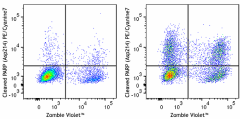
-

Human T leukemia cell line Jurkat treated (right) or non-treated (left) with anti-human CD95 (Fas) 4 hours, stained with Zombie Violet™ (Cat No. 423114) for 15 minutes, fixed with Fixation Buffer (Cat No. 420801), permeabilized with True-Phos™ Perm Buffer (Cat No. 425401), then stained with anti-Cleaved PARP (Asp214) recombinant (clone QA17A17) PE/Cyanine7. -

Human T leukemia cell line Jurkat treated (filled histogram) or non-treated (open histogram) with anti-human CD95 (Fas) 4 hours, fixed with Fixation Buffer (Cat No. 420801), permeabilized with True-Phos™ Perm Buffer (Cat No. 425401), then stained with anti-Cleaved PARP (Asp214) recombinant (clone QA17A17) PE/Cyanine7.
| Cat # | Size | Price | Quantity Check Availability | Save | ||
|---|---|---|---|---|---|---|
| 669907 | 25 tests | 141€ | ||||
| 669908 | 100 tests | 329€ | ||||
PARP (ADP-Ribose) Polymerase (PARP) is a 113 kD nuclear protein important for mediating the normal cellular response to DNA damage and repair in response to environmental stress. PARP catalyzes the transfer of ADP-ribose units from NAD⁺ to various nuclear proteins, including topoisomerases, histones, and PARP itself, by poly(ADP-ribosyl)ation. Following DNA damage, this protein is cleaved by ICE-like caspases, such as caspase-3 and -7. In humans, this PARP cleavage occurs between Asp214 and Gly215, yielding an 89 kD (from the carboxy-terminal catalytic domain) and a 24 kD fragment (from the amino-terminal DNA binding domain). PARP is an important regulator of cellular differentiation, proliferation, and tumor transformation, and PARP cleavage is considered a classical characteristic of cells undergoing apoptosis. Additionally, this enzyme may be the site of mutation in Fanconi anemia, and may contribute to the pathophysiology of type I diabetes.
Product DetailsProduct Details
- Verified Reactivity
- Human
- Antibody Type
- Recombinant
- Host Species
- Mouse
- Immunogen
- Proprietary synthetic peptide
- Formulation
- Phosphate-buffered solution, pH 7.2, containing 0.09% sodium azide and BSA (origin USA)
- Preparation
- The antibody was purified by affinity chromatography and conjugated with PE/Cyanine7 under optimal conditions.
- Concentration
- Lot-specific (to obtain lot-specific concentration and expiration, please enter the lot number in our Certificate of Analysis online tool.)
- Storage & Handling
- The antibody solution should be stored undiluted between 2°C and 8°C, and protected from prolonged exposure to light. Do not freeze.
- Application
-
ICFC - Quality tested
- Recommended Usage
-
Each lot of this antibody is quality control tested by intracellular immunofluorescent staining with flow cytometric analysis. For flow cytometric staining, the suggested use of this reagent is 5 µL per million cells in 100 µL staining volume or 5 µL per 100 µL of whole blood. It is recommended that the reagent be titrated for optimal performance for each application.
- Excitation Laser
-
Blue Laser (488 nm)
Green Laser (532 nm)/Yellow-Green Laser (561 nm)
- Application Notes
-
The QA17A17 antibody reacts with the 89 kD (cleaved at Asp214) fragment of human PARP1. It does not react with full-length PARP1.
Fixation and permeabilization using the True-Nuclear Buffer Set and Intracellular Staining Permeabilization Wash Buffer (10X) have also been confirmed to work in addition to the True-Phos™ Perm Buffer during in-house testing and development to detect cleaved PARP (Asp214). - RRID
-
AB_2922644 (BioLegend Cat. No. 669907)
AB_2922644 (BioLegend Cat. No. 669908)
Antigen Details
- Structure
- The large fragment of cleaved PARP is an 801 amino acid product with a predicted molecular weight of 89 kD
- Distribution
-
Nuclear
- Function
- Molecular “nick sensor”; base excision repair; catalyzes poly(ADP-ribosyl)ation of acceptor proteins involved in chromatin architecture; DNA metabolism; protein modification may enhance or repress transcription
- Interaction
- Component of a base excision repair complex containing at least XRCC1, PARP2, POLB and LIG3. Heterodimerizes with PARP2, interacts with PARP3, modified TATA-BP, YY1, Sp1, NF-B, p53 and others
- Biology Area
- Apoptosis/Tumor Suppressors/Cell Death, Cell Biology, DNA Repair/Replication, Transcription Factors
- Molecular Family
- Nuclear Markers
- Antigen References
- Gene ID
- 142 View all products for this Gene ID
- UniProt
- View information about Cleaved PARP on UniProt.org
Related FAQs
Other Formats
View All Cleaved PARP Reagents Request Custom Conjugation| Description | Clone | Applications |
|---|---|---|
| PE anti-Cleaved PARP (Asp214) Recombinant Antibody | QA17A17 | ICFC |
| Purified anti-Cleaved PARP (Asp214) Recombinant Antibody | QA17A17 | WB,ICC,ICFC |
| PerCP/Cyanine5.5 anti-Cleaved PARP (Asp214) Recombinant Antibody | QA17A17 | ICFC |
| APC anti-Cleaved PARP (Asp214) Recombinant Antibody | QA17A17 | ICFC |
| PE/Cyanine7 anti-Cleaved PARP (Asp214) Recombinant Antibody | QA17A17 | ICFC |
Customers Also Purchased
Compare Data Across All Formats
This data display is provided for general comparisons between formats.
Your actual data may vary due to variations in samples, target cells, instruments and their settings, staining conditions, and other factors.
If you need assistance with selecting the best format contact our expert technical support team.
-
PE anti-Cleaved PARP (Asp214) Recombinant Antibody
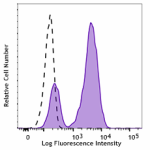
Human T leukemia cell line Jurkat treated (filled histogram)... 
Human T leukemia cell line Jurkat treated (right) or non-tre... -
Purified anti-Cleaved PARP (Asp214) Recombinant Antibody
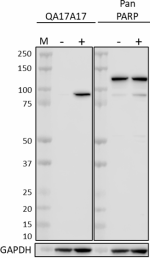
Whole cell extracts (15 μg protein) from HeLa cells untreate... 
HeLa cells untreated (A) or treated (B) with 1 μM staurospor... 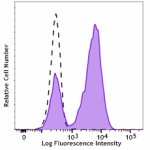
Human T leukemia cell line Jurkat treated (filled histogram)... 
Human T leukemia cell line Jurkat treated (Right) or non-tre... -
PerCP/Cyanine5.5 anti-Cleaved PARP (Asp214) Recombinant Antibody
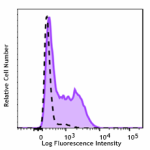
Human T leukemia cell line Jurkat treated (filled histogram)... 
Human T leukemia cell line Jurkat treated (right) or non-tre... -
APC anti-Cleaved PARP (Asp214) Recombinant Antibody
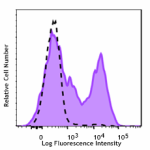
Human T leukemia cell line Jurkat treated (filled histogram)... 
Human T leukemia cell line Jurkat treated (right) or non-tre... -
PE/Cyanine7 anti-Cleaved PARP (Asp214) Recombinant Antibody

Human T leukemia cell line Jurkat treated (right) or non-tre... 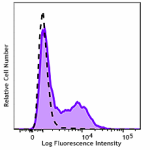
Human T leukemia cell line Jurkat treated (filled histogram)...

 Login / Register
Login / Register 









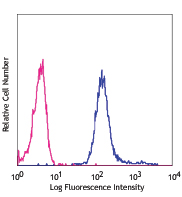


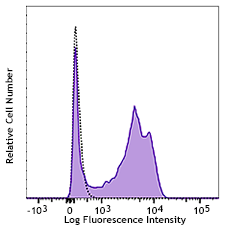



Follow Us